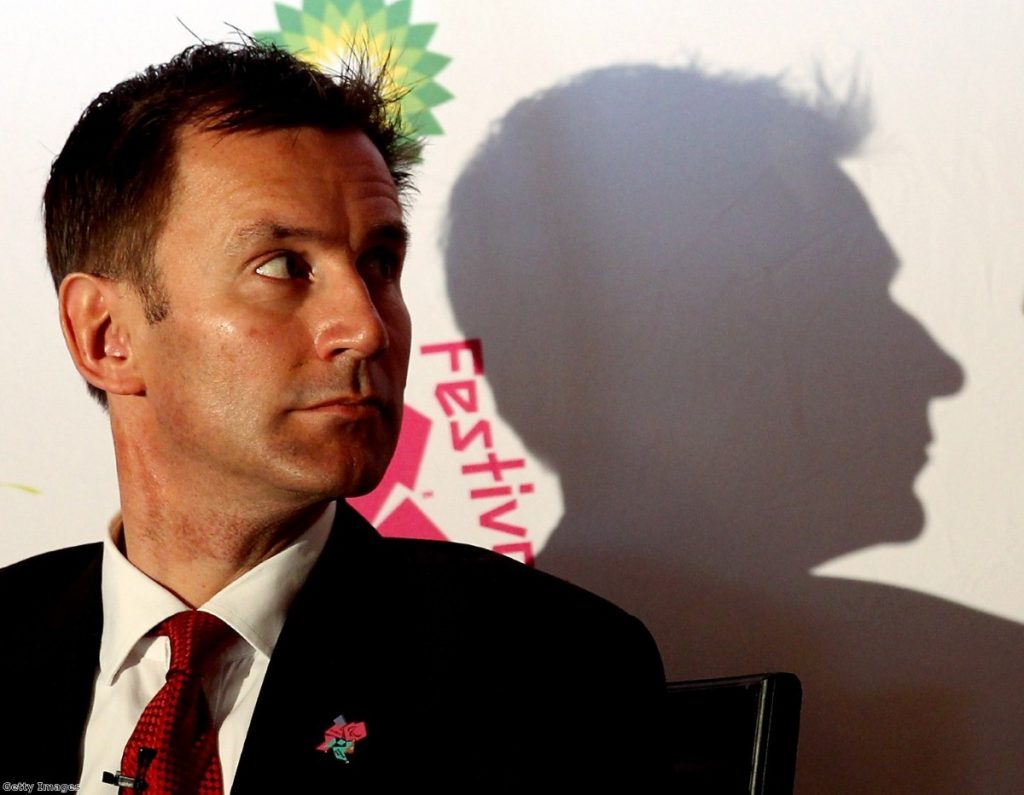Hunted: Pressure builds on No.10 over BSkyB row
Downing Street's attempts to prevent an independent inquiry into Jeremy Hunt's actions during News Corp's bid for BSkyB seemed doomed to failure last night, amid mounting pressure in Westminster.
Senior Conservatives and Liberal Democrats have broken ranks to question David Cameron's resistance to an inquiry, while the opposition raised the stakes with a series of moves designed to heap further embarrassment on the government.
Labour demanded the publication of all emails and text messages between Mr Hunt and his special adviser, Adam Smith, last night. Downing Street initially resisted that demand but this morning appeared to cave in.
"Every day David Cameron looks more like a prime minister organising a cover up rather than standing up for the public," Ed Miliband said today.


“People watching this prime minister's actions will conclude he has a great deal to hide and that his real fear is that Jeremy Hunt's resignation will put his own actions and behaviour centre stage."
Deputy Liberal Democrat leader Simon Hughes went distinctly off-message during BBC One's Question Time last night when he suggested an independent inquiry into Mr Hunt.
"What I cannot understand is why the matter of the ministerial code of conduct, which is to do with 'do you take responsibility for your special adviser', is not something the prime minister should immediately refer to the person who has been given the job of doing that,"he said.
The comments directly contradict the position of his boss Nick Clegg, whose office put out a statement saying the Leveson inquiry should be allowed to proceed without an independent inquiry.
But even Mr Clegg's adherence to the government line cannot necessarily be relied upon. While other front benchers rallied behind Mr Hunt during this week's PMQs, Mr Clegg appeared far more critical.
Tory grandee Bernard Jenkins, chairman of the Commons public administration committee, also demanded the case be handed to Sir Alex Allan, the prime minister’s independent adviser on ministers’ interests.
"There was clearly something of a breakdown of good process and good governance," he said.
"We have a new Cabinet secretary and he should demonstrate his independence and advise the prime minister. If he thinks there has been a prima facie case of a breach of the ministerial code, it should go straight to the independent adviser."
Mr Hunt sacrificed his special adviser on Wednesday, much to the bemusement and incredulity of fellow MPs.
Mr Smith's name features prominently in the emails to Frédéric Michel, News Corp's public affairs executive, and Mr Hunt claims that, while he was authorised to engage in communications with the firm, he overstepped the mark by offering up-to-the-minute commentary, confidential information and yet-to-be-delivered ministerial statements.
Parliamentarians consider it highly unlikely that Mr Smith could operate autonomously from his minster, given that the relationship between secretaries of state and their special adviser is usually extremely close.
The ministerial code also makes ministers accountable to their special advisers, meaning anything laid at the door of Mr Smith directly reflects on Mr Hunt.
Meanwhile, further details have emerged of the lengths Downing Street had gone to keep the Hunt allegations solely in the realm of the Leveson inquiry.
The Cabinet Office confirmed that Cabinet secretary Sir Jeremy Heywood had privately asked Lord Leveson to ask for the Hunt case to be heard at the inquiry at an early oppourtunity.
The next day Lord Leveson began the session by stressing that he believed it was inappropriate for other investigations to be running in parallel to his inquiry.
Downing Street admitted, however, that Leveson has no remit to decide on whether Jeremy Hunt broke the ministerial code or whether he should remain in office.
Opposition pressure is now turning to Mr Hunt's permanent secretary, Jonathan Stephens. Mr Hunt claimed in parliament that Mr Stephens signed off on the decision to make Mr Smith his 'point man' with the Murdoch camp during the BSkyB deal.
Mr Stephens refused to confirm that on ten separate occasions when he appeared in front of the public accounts committee yesterday – to the clear irritation of MPs.
The Department of Culture, Media and Sport was then forced to issue a statement saying Mr Stephens was "aware" of the decision and "content" with it.
Labour wrote to Mr Stephens last night asking whether he knew in advance that Mr Smith was to act as point man and whether he confirmed the arrangement in advance.
Mr Hunt's political demise could yet come from another angle entirely, as the Financial Services Authority (FSA) toyed with implementing an investigation into the alleged leaking of sensitive financial information, as a result of the emails.
Media watchdog Ofcom has also escalated its inquiry into BSkyB. It could force the Murdoch clan to give up their remaining stake in the company.












